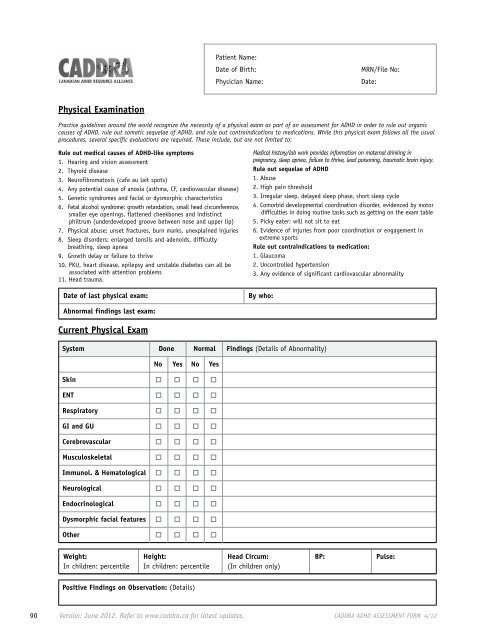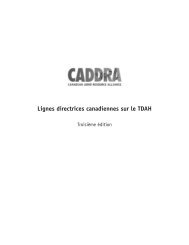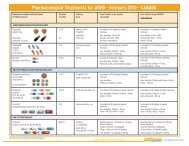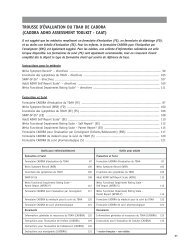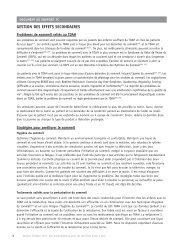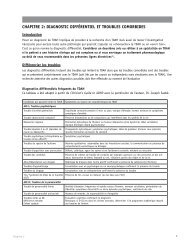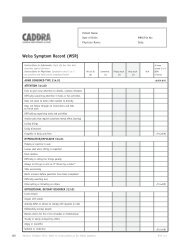CADDRA ADHD ASSESSMENT TOOLkIT (CAAT) FORMS
CADDRA ADHD ASSESSMENT TOOLkIT (CAAT) FORMS
CADDRA ADHD ASSESSMENT TOOLkIT (CAAT) FORMS
You also want an ePaper? Increase the reach of your titles
YUMPU automatically turns print PDFs into web optimized ePapers that Google loves.
Physical Examination<br />
Practice guidelines around the world recognize the necessity of a physical exam as part of an assessment for <strong>ADHD</strong> in order to rule out organic<br />
causes of <strong>ADHD</strong>, rule out somatic sequelae of <strong>ADHD</strong>, and rule out contraindications to medications. While this physical exam follows all the usual<br />
procedures, several specific evaluations are required. These include, but are not limited to:<br />
Rule out medical causes of <strong>ADHD</strong>-like symptoms<br />
1. Hearing and vision assessment<br />
2. Thyroid disease<br />
3. Neurofibromatosis (cafe au lait spots)<br />
4. Any potential cause of anoxia (asthma, CF, cardiovascular disease)<br />
5. Genetic syndromes and facial or dysmorphic characteristics<br />
6. Fetal alcohol syndrome: growth retardation, small head circumference,<br />
smaller eye openings, flattened cheekbones and indistinct<br />
philtrum (underdeveloped groove between nose and upper lip)<br />
7. Physical abuse: unset fractures, burn marks, unexplained injuries<br />
8. Sleep disorders: enlarged tonsils and adenoids, difficulty<br />
breathing, sleep apnea<br />
9. Growth delay or failure to thrive<br />
10. PKU, heart disease, epilepsy and unstable diabetes can all be<br />
associated with attention problems<br />
11. Head trauma.<br />
Date of last physical exam: By who:<br />
Abnormal findings last exam:<br />
Current Physical Exam<br />
System Done Normal Findings (Details of Abnormality)<br />
Skin<br />
ENT<br />
Respiratory<br />
GI and Gu<br />
Cerebrovascular<br />
Musculoskeletal<br />
Immunol. & Hematological<br />
Neurological<br />
Endocrinological<br />
Dysmorphic facial features<br />
Other<br />
No Yes No Yes<br />
90 Version: June 2012. Refer to www.caddra.ca for latest updates.<br />
Medical history/lab work provides information on maternal drinking in<br />
pregnancy, sleep apnea, failure to thrive, lead poisoning, traumatic brain injury.<br />
Rule out sequelae of <strong>ADHD</strong><br />
1. Abuse<br />
2. High pain threshold<br />
3. Irregular sleep, delayed sleep phase, short sleep cycle<br />
4. Comorbid developmental coordination disorder, evidenced by motor<br />
difficulties in doing routine tasks such as getting on the exam table<br />
5. Picky eater: will not sit to eat<br />
6. Evidence of injuries from poor coordination or engagement in<br />
extreme sports<br />
Rule out contraindications to medication:<br />
1. Glaucoma<br />
2. Uncontrolled hypertension<br />
3. Any evidence of significant cardiovascular abnormality<br />
Weight: Height: Head Circum: BP: Pulse:<br />
In children: percentile In children: percentile (In children only)<br />
Positive Findings on Observation: (Details)<br />
Patient Name:<br />
Date of Birth: MRN/File No:<br />
Physician Name: Date:<br />
<strong>CADDRA</strong> <strong>ADHD</strong> <strong>ASSESSMENT</strong> FORM 4/12


